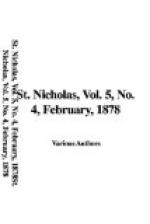And now the poor defrauded osprey must go to work and catch another fish before he can have his dinner. Here you see the bald eagle with his ill-gotten prey.
[Illustration: THE BALD EAGLE.]
Great flocks of ducks often come to fish in the shallow water close to the shore. I suppose the reason that they come so near is that they find smaller fish here than in the deep water; and another reason, they are never shot at near the shore, for no fire-arms are allowed to be discharged within the town limits, except under the penalty of five dollars for each discharge.
This place, in winter, corresponds to a northern watering-place in summer. There is a warm sulphur-spring here, and people come from all quarters for health and for amusement. At first the great numbers of birds all about attracted many sportsmen, but I am very glad to tell you that the Florida people did not like this reckless shooting of birds in their midst, so they made this beautiful little place—Green Cove Spring—a city, and elected a mayor and a marshal, and other officers, to keep the men straight, and to protect the birds.
So this is why the birds that live about this little city are so tame, and why the ducks come so close to us; they have learned that they are quite safe from guns here.
Several species of ducks may sometimes be seen in one flock, fishing together in perfect harmony. It is quite astonishing how long they can stay under water, and when they come up their feathers are not wet at all.
The most beautiful of these fishing-ducks is the hooded merganser. Its plumage is most elegant, and it has a large thick tuft or crest of feathers covering the whole head, which gives it a sort of military look; and, indeed, it seems to be a commander, for it leads all of its relatives. It sometimes stays so long under the water that I begin to fear something has happened,—that an alligator, or some other huge beast, has got hold of it; but it always makes its appearance after a while, often at quite a long distance from where it went under.
NAN’S PEACE-OFFERING.
BY KATE W. HAMILTON.
“Just wish I was properer, and everything—so there!” said Nannie, sitting discontentedly down upon the green grass by the road-side, and surveying herself with a pair of very serious brown eyes.
It was a forlorn little self, surely, with wet dress, muddy shoes, inky apron, and crumpled sun-bonnet.
“Aunt S’mantha’ll think I’m dreadful. She says I never have any forethought; but I have lots of after-thoughts, and I s’pose folks can’t have both kinds. It don’t do any good, either. Oh dear!”
There was a whistled tune coming up the road. Tommy Grey was attached to it, but the whistle seemed much the older and more important of the two, and was first to reach the tree where Nannie was sitting. When Tommy caught up with it, he stopped in surprise.




